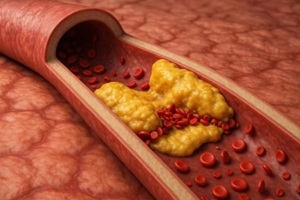 Getting your cholesterol checked is an important way to assess your risk of heart disease. However, many things can cause your cholesterol test levels to fluctuate on a short-term basis.
Getting your cholesterol checked is an important way to assess your risk of heart disease. However, many things can cause your cholesterol test levels to fluctuate on a short-term basis.
That’s why being aware of factors that impact cholesterol can help you better understand cholesterol test results and make informed lifestyle changes to support long-term cardiovascular health.
How Diet Impacts Cholesterol Tests
The food you eat in the days leading up to a cholesterol test can significantly influence results. For example, saturated and trans fats tend to increase total and LDL “bad” cholesterol. Meanwhile, monounsaturated and polyunsaturated fats, fiber, and plant sterols may help lower cholesterol.
To get the most accurate baseline, avoid high-fat foods for a few days before testing. Steer clear of fried dishes, full-fat dairy, fatty meat cuts, baked goods, and tropical oils. Instead, focus on healthy fats from olive oil, avocados, nuts, seeds, and fatty fish while loading up on fruits, vegetables, and whole grains. Additionally, staying well-hydrated is also important.
How Coffee and Caffeine May Increase Cholesterol
While diet plays a major role, beverages can also affect your results. Coffee beans and tea leaves contain oily substances called diterpenes that can raise total and LDL cholesterol levels when consumed in excess. Unfiltered coffee brewing methods, such as French press and espresso, have the highest diterpene content.
Caffeinated energy drinks may also have adverse effects on cholesterol due to their high sugar and artificial ingredients. Herbal tea, in contrast, does not affect cholesterol. So to prevent coffee or energy drinks from temporarily increasing your cholesterol, consider abstaining for 24-48 hours before your screening.
How Stress Can Increase Cholesterol
Beyond what you consume, your emotional state matters too. Have you heard of the fight-or-flight response triggered by stress? While a limited amount of stress can be beneficial, chronic levels activate the release of cortisol and epinephrine. These stress hormones tend to increase LDL and total cholesterol while lowering protective HDL.
That’s why you should prioritize relaxation through yoga, meditation, or music to avoid skewed test results. Simple breathing exercises for just a few minutes daily can also curb cortisol. Getting adequate sleep, taking regular movement breaks, and saying no to unnecessary obligations further bolster resilience.
How Smoking Cigarettes Impacts Your Test
 Another lifestyle factor that significantly affects cholesterol is smoking. Cigarette smoke introduces free radicals into the bloodstream, which convert LDL cholesterol into a more dangerous oxidized form. This substance builds up on the fragile walls of arteries. The nicotine in tobacco also lowers HDL, your body’s built-in cholesterol remover. Together, this significantly heightens cardiovascular disease risk.
Another lifestyle factor that significantly affects cholesterol is smoking. Cigarette smoke introduces free radicals into the bloodstream, which convert LDL cholesterol into a more dangerous oxidized form. This substance builds up on the fragile walls of arteries. The nicotine in tobacco also lowers HDL, your body’s built-in cholesterol remover. Together, this significantly heightens cardiovascular disease risk.
Ideally, quit smoking altogether through evidence-based methods. However, if that timing does not work for you, simply abstaining from cigarettes for at least 12 hours before your cholesterol screening will provide more accurate results.
How Certain Medications Can Influence Cholesterol Levels
While lifestyle factors are often controllable, medications present a different challenge. Various prescription drugs are linked to changes in cholesterol balance, either by inhibiting production or interfering with clearance. Some common culpable medication classes include:
- Corticosteroids
- Immunosuppressants
- HIV treatment regimens
- Beta blockers
- Thiazide diuretics
Never adjust or stop taking medication on your own; have an open conversation with your prescribing provider. They can determine if switching to an alternate therapy makes sense based on your cardiovascular risk factors and other conditions. Lifestyle measures may also be recommended to counteract any cholesterol-increasing effects.
How Weight Loss Can Temporarily Increase LDL Cholesterol
Surprisingly, even positive health changes can temporarily affect your numbers. Starting a reduced-calorie diet to shed excess pounds deserves applause. But drastic drops in weight tend to mobilize fatty tissue as it breaks down. This floods the bloodstream with cholesterol that adipose previously stored, reflected in a short-term rise of LDL on screening tests.
But don’t be alarmed by this bump, because it is temporary. The longer you stick to your healthy nutritional changes, routine activity, and sensible weight loss of just 1-2 pounds per week, the more your overall cholesterol profile will improve.
How Pregnancy Shifts Your Cholesterol Profile
 Pregnancy represents another natural but significant influence on cholesterol levels. Hormone surges necessary to support fetal development often impact cholesterol levels in expectant mothers. For instance, estrogen, progesterone, placental lactogen, and increasing insulin resistance all contribute to LDL elevations of 30-40% on average. Changes typically peak late in the second trimester before plateauing in the ninth month.
Pregnancy represents another natural but significant influence on cholesterol levels. Hormone surges necessary to support fetal development often impact cholesterol levels in expectant mothers. For instance, estrogen, progesterone, placental lactogen, and increasing insulin resistance all contribute to LDL elevations of 30-40% on average. Changes typically peak late in the second trimester before plateauing in the ninth month.
Discuss repeat testing with your OBGYN to determine if medication is advisable. In most cases, cholesterol levels return to normal post-delivery as hormones regulating pregnancy decline after birth. Breastfeeding may help accelerate this reduction phase. Additionally, lifestyle measures can help mitigate cholesterol increases during subsequent pregnancies.
Short-Term Increases Versus Chronic High Cholesterol
Given all these influencing factors, it’s essential to be aware of the bigger picture. Many elements that are part of routine living can cause cholesterol fluctuations on a day-to-day basis. Stress, diet, sleep patterns, hydration, supplement use, and more all impact our bodies. So cholesterol screening results provide only a single snapshot in time.
In other words, try not to panic over a single high reading, but instead look at the longer cholesterol trend. Tracking patterns over months and years, along with imaging tests for plaque buildup, gives a clearer picture of cardiovascular health than any one-off lab result.
That’s why repeat testing, while limiting temporary influencing factors, is advisable whenever cholesterol levels return higher than desired. Your doctor can also help interpret the results and coordinate advanced lipid testing, if necessary, based on your personal and family medical histories.
Ongoing preventative screenings and open conversations build context around what cholesterol patterns imply for your heart. This facilitates prompt treatment if necessary to avoid complications such as a heart attack or stroke down the road.
Schedule Your Cholesterol Test Today
 Do you have questions about your cholesterol test results or steps to reduce your risk of cardiovascular disease? Imperial Center Family Medicine‘s healthcare providers have specialized expertise in evidence-based lifestyle counseling, advanced lipid testing interpretation, and medication management, if needed.
Do you have questions about your cholesterol test results or steps to reduce your risk of cardiovascular disease? Imperial Center Family Medicine‘s healthcare providers have specialized expertise in evidence-based lifestyle counseling, advanced lipid testing interpretation, and medication management, if needed.
Contact us today at 919-873-4437 or online to take charge of your heart health through proactive cholesterol care. We’ll work together to develop a prevention or treatment plan that is the right fit based on your health profile and wellness vision.
